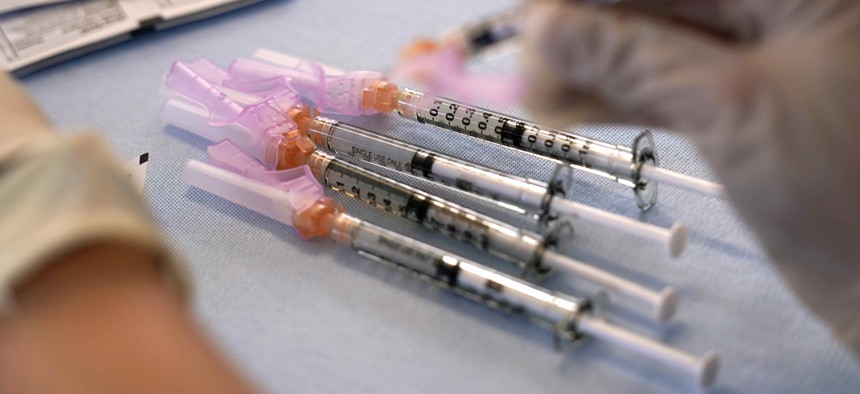Mayors Want Vaccines Distributed Directly to Cities

A worker readies syringes with the Moderna COVID-19 vaccine on March 29, 2021, at "Vaccine Fest," a 24-hour COVID-19 mass vaccination event in Metairie, La., just outside New Orleans, hosted by Ochsner Health System and the Jefferson Parish Government. AP Photo/Gerald Herbert
The proposal, pitched to the White House on Monday, would mean bypassing states. It’s likely to be a tough sell given the added complications it would involve.
Dozens of mayors from across the U.S. are calling on the Biden administration to provide Covid-19 vaccine doses directly to cities, making a case that they’re better positioned than state governments to carry out equitable and efficient efforts to get more shots into arms.
A bipartisan group of 116 of the city leaders made the request in a letter sent Monday from the U.S. Conference of Mayors to the White House. The mayors also urged the administration to ensure that states “do not interfere with our allocations” of the vaccine. “City governments understand our communities and our local infrastructure best,” they wrote.
But their proposal could be a tough sell due to the added complications apt to arise with widely distributing the vaccine directly to dozens, or even hundreds, of cities. That’s as opposed to the current system, which depends in large part on the federal government allocating doses to states, along with certain pharmacies and community health centers.
Jeffrey Levi, a professor of health policy and management at the George Washington University, suggested the shift would likely amount to a “logistical nightmare” for the federal government, especially given that demand for the vaccine has so far exceeded supply.
“There are thousands of counties and cities in the United States,” he said. “Figuring out who has the capacity to deliver—because not all will have that capacity—and then figuring out what is an equitable allocation, under ordinary circumstances, would be a logistical challenge.”
“Under emergency circumstances, even more of a challenge,” Levi added.
The Conference of Mayors wasn't able to arrange for someone to provide comment about the letter on Monday.
Many states are now taking significant steps to open up vaccine eligibility to more people. The Biden administration said Monday that, by April 19, it expects 90% of U.S. adults to be eligible for the shots and to have a vaccination site within five miles of where they live. At least 31 states have said they will open eligibility to all adults by that date.
President Biden has called for states, tribes and territories to make all U.S. adults eligible for vaccination no later than May 1.
“We’re headed in the right direction. But we can’t slow down. Millions remain unvaccinated and at risk,” said Andy Slavitt, a senior advisor to the White House on the pandemic. He added that more than 50 million Americans—a figure approaching 1 in 5 adults—are fully vaccinated.
Along with the progress, however, there are racial inequities with the vaccine rollout. The Kaiser Family Foundation says in an analysis released earlier this month that there’s “a consistent pattern across states of Black and Hispanic people receiving smaller shares of vaccinations compared to their shares of cases and deaths and compared to their shares of the total population.”
The Kaiser researchers note that, when looking across about 40 states, the overall vaccination rate among white people was more than twice as high as the rate for Hispanic people (19% vs. 9%) and nearly twice as high as the rate for Black people (19% vs. 11%).
The mayors cite racial disparities like these as one reason their idea of sending vaccines directly to cities is worth consideration.
“We see and do not accept the troubling pattern emerging nationwide showing that people of color and vulnerable populations do not have sufficient access to the vaccine,” their letter says.
“Many of those people live in cities—and as mayors of those cities, for the sake of our most marginalized constituents, we ask that you provide us direct allocation with true local control so that we can increase the efficiency and equity of vaccine distribution,” it adds.
Levi, the public health professor, said that the “underlying issue that the cities raise about who is closest to the populations at risk” is valid. “The state is a little bit distant,” he added. But he said the federal government would likely be better off working with community health center clinics that serve vulnerable populations, rather than using local governments as an intermediary.
He also said that if the mayors have concerns about how states are managing their vaccine allocations, a better path for the city officials might be pushing for new federal mandates on how states use their doses, rather than advocating for a direct supply to cities.
Slavitt said on Monday that as part of an effort to meet Biden’s updated goal of 200 million shots in his first 100 days in office, the White House was announcing two new federally run mass vaccination sites, one in St. Louis and another in Gary, Indiana.
He said the federal government now has 21 vaccination sites up and running that have together already administered about 1.7 million shots. The sites are operated by the federal government in partnership with state and local governments.
The White House on Monday also announced plans to expand a federal program to make vaccines available through retail pharmacies to nearly 40,000 stores, from 17,000, within the next three weeks. The administration says that about 45% of participating pharmacies in the Federal Retail Pharmacy Program are located in “the highest-need neighborhoods.”
In their letter, the mayors also said they remain worried about the availability of protective equipment and other supplies related to the virus response and urged the administration to take additional measures to boost production and stockpiles of these goods.
Bill Lucia is a senior editor for Route Fifty and is based in Olympia, Washington.
NEXT STORY: Colorado Bill Would Give Rape, Sexual Assault Survivors Evidence Updates






